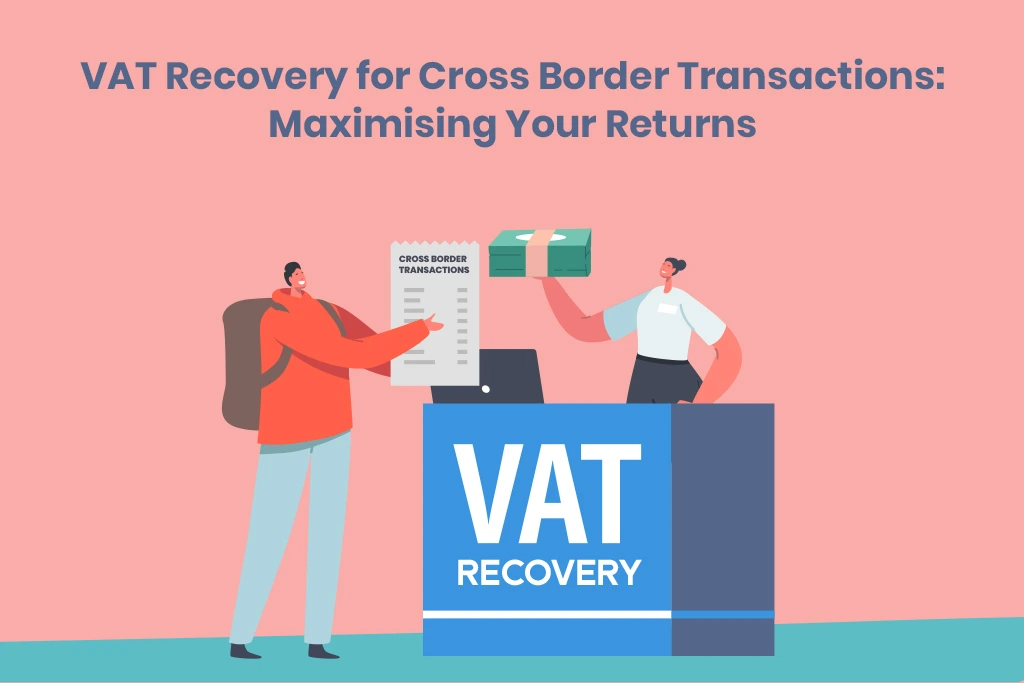Introduction
Businesses in the global marketplace often enter into cross-border transactions, at times involving the remittance of Value-Added Tax against goods and services purchased in foreign jurisdictions. That may prove to be costly for the business; however, even in their very act of managing their VAT, most miss the opportunity to recover the VAT paid abroad. This article will try to bring out the difficulties in cross-border VAT recovery, with practical insights and strategies to help your business maximise returns.
What is cross-border VAT recovery?
Cross-border VAT recovery refers to the process through which a business reclaims the Value-Added Tax charged on purchases made in other countries. These include purchases for travel, accommodation, and other miscellaneous services that are not only central but also critical to running business concerns. Few of them try to get their money back, and so a lot of money just goes down the drain.
The European Commission has estimated that businesses fail to recover an annual EUR 13 Billion in VAT refunds. This is a huge loss, more so for companies whose margins are very slim.
Why is VAT recovery important for your business?
VAT recovery is of absolute importance. It can help improve cash flow, reduce the overall cost, and enhance the bottom line for any business. For companies with extensive international trade, VAT recovery may be a very large portion of annual expenditure. Recovery of these funds can give a competitive edge since this money can be reinvested in several other growth opportunities.
How does the VAT recovery process work?
While it may be extremely profitable, the VAT recovery process does involve close attention to detail and observance of a host of country-specific regulations. Indeed, following is a step-by-step guide on how to recover the VAT:
Identify Eligible Expenses: Typically, they are related to travel, hotel stays, rental of cars, fuel, conference fees, and some kinds of professional services. What’s important here is knowing which expenses would be eligible for VAT recovery in countries where transactions have occurred.
Documentation: This is an area that really should be taken care of to have a successful VAT recovery claim. It involves the retention of original invoices, proof of payment, and that these documents meet the specific requirements of the tax authorities in each country.
Claims Submissions: Must take place within the time limits set by each country, typically between 6-9 months from the end of the calendar or fiscal year in which the expenses were incurred. Late submissions are not usually accepted, so it is important to keep on top of deadlines.
Common cross-border VAT recovery issues
While the benefit is clear, there are challenges related to VAT recovery. Not only is the law surrounding VAT complex and differing in each country, but it also faces language barriers, differing documentation requirements, and differing refund processes.
A survey showed that 75% of companies consider the VAT recovery process to be complex, mainly because of the various rules in force in different countries. The complications often discourage companies from undertaking the VAT recovery process, and hence, therefore, these amounts remain unclaimed.
In which countries is there the best opportunity for VAT recovery?
Not all countries are equal in terms of VAT recovery opportunities. Knowing which jurisdictions are more favourable can enable companies to focus their efforts.
EU Countries: Most of the countries that are members of the European Union have laid down simplified procedures for facilitating the recovery of VAT. The EU VAT Directive allows for some consistency among the member states, though there are still differences between them.
Non-EU Countries: The countries that do not constitute the European Union also have different methods for recovering their Value-Added Tax. A few of them have reciprocal arrangements in place, hence making procedures easy, but some countries might be really strict or have little chance of recovery.
How can automation and technology simplify VAT recovery?
Technology is certainly one of the main differentiators in making a difference when it comes to simplifying the VAT recovery process. With the help of automation tools or specially designed VAT recovery software, firms are better positioned to track eligible expenses, organise supporting documents for the same, and eventually submit claims.
Industry research shows that companies using VAT recovery software report at least a 25% minimum increase in additional successful claims. Automation minimises human error risks, ensures international changing compliance, and accelerates recovery.
Tips to maximise your VAT recovery returns
Regular Audit: Conduct regular audits of your business expenses to determine the type of VAT that you can recover. This will ensure that no potential refund is missed.
Consult Experts: VAT recovery may be complicated, more so in business deals across borders. Any business can seek advice on this from the experts in VAT recovery or involve firms that deal with specialising in the same. Such experts understand the intricacies of cross-border VAT and how to navigate them on your behalf.
Stay Updated: VAT rules and regulations are evolving, and keeping oneself updated with regard to any change in taxation is very imperative. Keep looking for updates provided by the taxation authorities and, from time to time, adjust your VAT recovery strategy accordingly.
Conclusion
VAT recovery is a significant yet oft-underutilised opportunity for businesses operating across borders. If one fully understands the recovery process, has the support of technology, and engages the right expertise, one’s business can win back large amounts of VAT that can be used for better liquidity and health. As global trade continues to surge, maximising VAT recovery returns will become tantamount to sustaining a competitive edge.
Disclaimer:
This blog is for information purposes only and should not be relied or acted upon when making financial decisions. Always seek professional advise prior to taking any action.

 Call us:
Call us: 